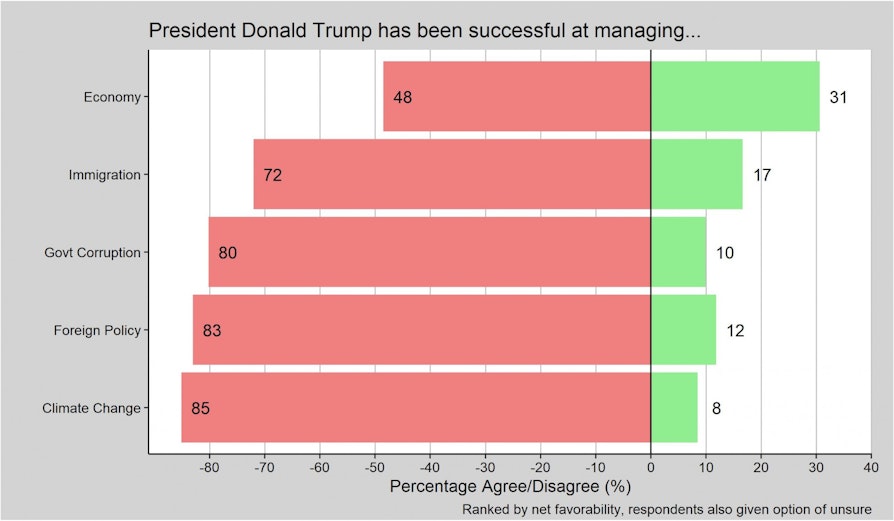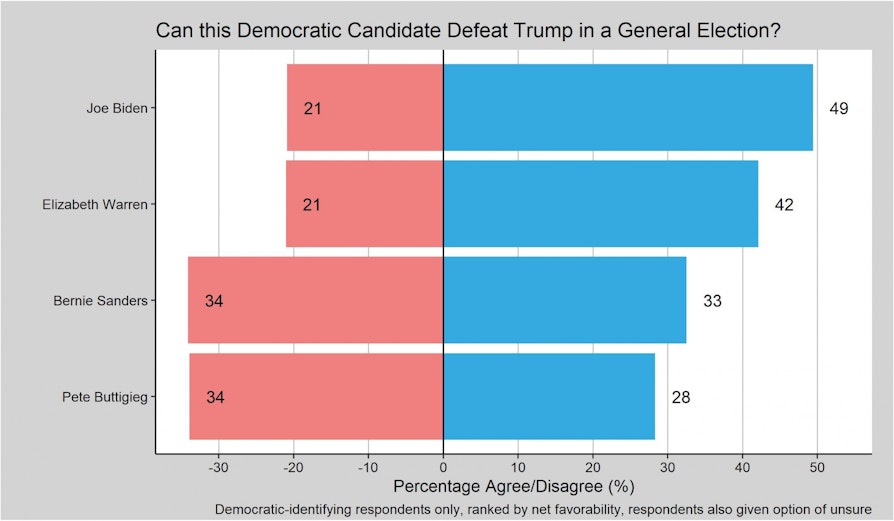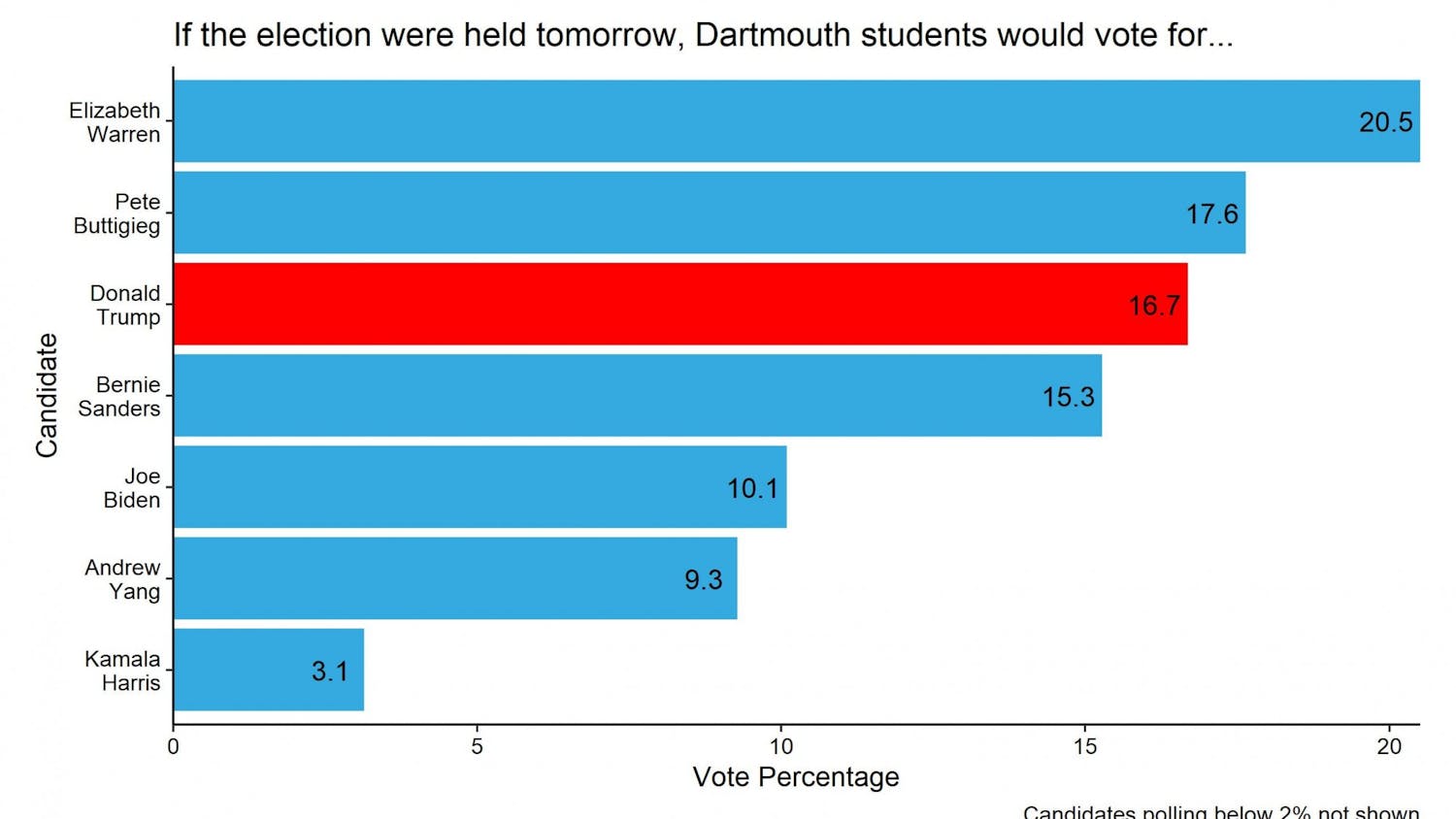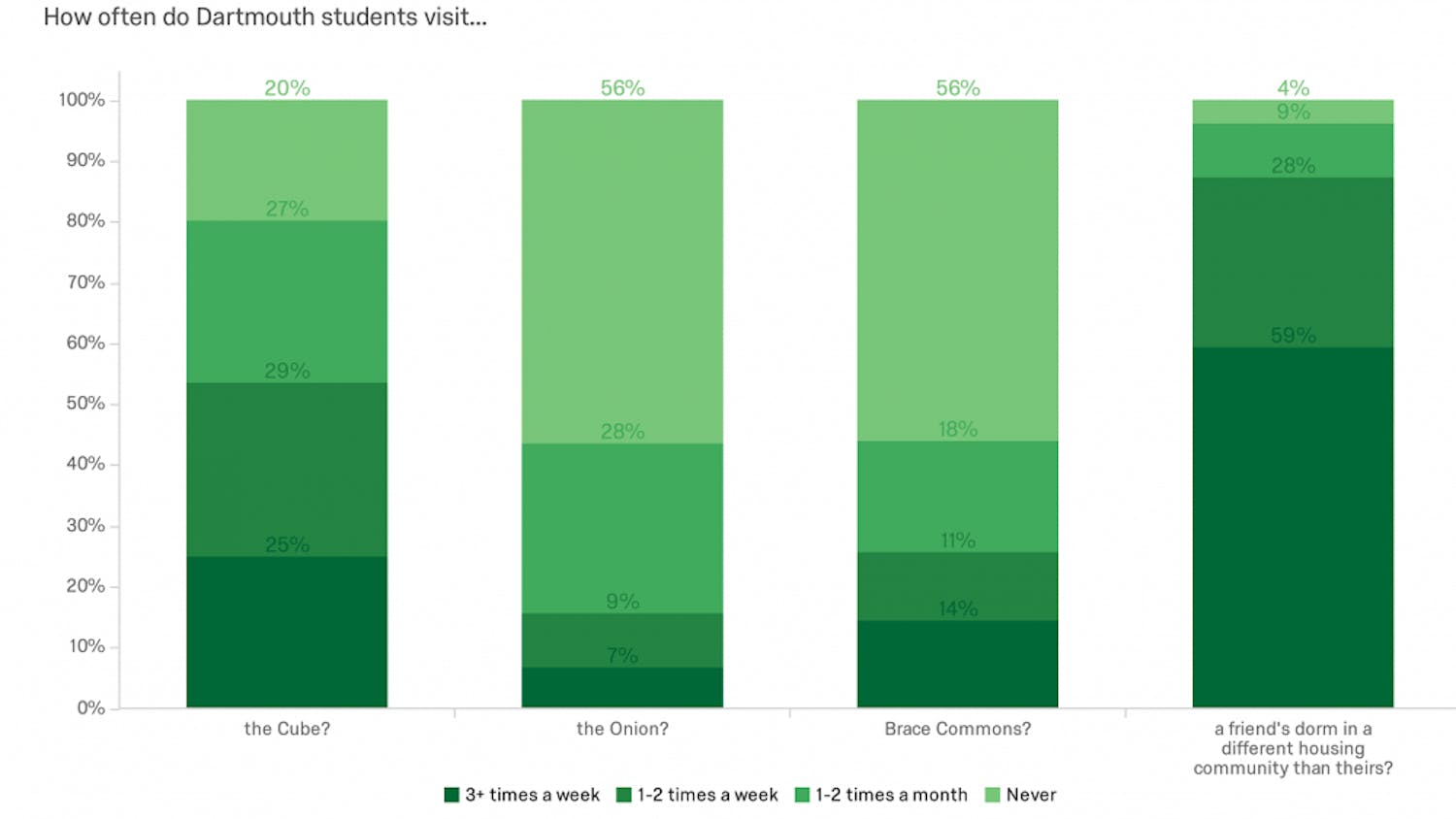The Dartmouth conducted a poll last month collecting students’ views on the upcoming presidential race and current political issues. Some of the key results were published at the end of the fall term. This article analyzes the results of the poll in full, on topics including: favorability of key institutions and people, which Democratic candidates students think have the best chance of defeating President Donald Trump, important policy issues and students’ motivation to vote in the election.
Favorability of various companies, figures and institutions generally low
Students were asked to indicate if they view various companies, figures and institutions favorably. In general, students do not view many politicians or political institutions favorably. Among all the items asked, the Democratic Party is viewed the most favorably, with 40 percent of students indicating that they have a favorable view while 36 percent have an unfavorable view. Speaker of the House Nancy Pelosi (D-CA) is also relatively favorable among students, with 35 percent viewing her favorably while 32 percent view her unfavorably. In contrast, Senate Majority Leader Mitch McConnell (R-KY) does not fare so well, with only nine percent viewing him favorably while 67 percent view him unfavorably. Students also view the Republican Party negatively, with only 16 percent viewing the party favorably and 70 percent viewing it unfavorably. Overall, Congress as a whole is viewed unfavorably, with only 10 percent of respondents having a favorable view, while 45 percent have an unfavorable one.
As the impeachment inquiry into President Trump continues to progress, The Dartmouth’s poll asked students about their views of some of the key figures involved. As chair of the House Intelligence Committee, Adam Schiff (D-CA) has been one of the most visible Democratic Party figures. However, most students do not hold a strong opinion on Schiff, with 62 percent indicating they are unsure of how they view him while 18 percent and 19 percent view him positively and negatively, respectively. Another key figure in impeachment proceedings is the anonymous whistleblower, whose report first triggered the investigation. Students appear to view the whistleblower somewhat negatively, with 31 percent viewing the whistleblower favorably and 40 percent unfavorably. Twenty-nine percent were unsure about how they view the whistleblower.
The Dartmouth’s poll also asked students about their views on social media companies like Facebook and Twitter, which have faced increased scrutiny following the 2016 election due to their role in influencing information flow to the public. Twitter is seen more positively than Facebook, with 29 percent of students viewing the company favorably and 34 percent viewing it unfavorably. In comparison, only nine percent of students have a favorable view of Facebook, while 65 percent have an unfavorable view. Additionally, when asked whether they felt social media companies have a responsibility to manage political content on their platforms, 48 percent of students believe that the companies have such a responsibility, while 29 percent disagree and 22 percent are unsure.
Trump approval ratings remain underwater among students
Dartmouth students remain significantly opposed to Trump’s actions as president. When asked whether they approve or disapprove of Trump’s overall performance, only 17 percent approve while 78 percent disapprove. Among specific aspects of Trump’s performance, students view Trump’s handling of the economy most positively. Thirty-one percent of students think Trump is successfully managing the economy while 48 percent disagree. Trump’s performance in other areas is viewed decidedly negatively. Only about 17 percent of students think Trump’s new immigration policy has been successful, 12 percent think his handling of foreign relationships has been successful, 10 percent think he is effectively handling government corruption and eight percent agree with how he is dealing with climate change.

Students generally disapprove of President Trump's handling of a variety of policy issues.
Democratic-identifying students value policy as much as “can beat Trump”
As the Democratic presidential primary field has remained dynamic with the first primaries and caucuses approaching, there has been anxiety among some Democratic voters about the eventual Democratic candidate’s perceived ability to beat Trump in the general election. Democratic-identifying students, who comprise 48 percent of poll respondents, were specifically asked a number of questions on this issue.
While 46 percent of Democratic-identifying students indicate that they view a candidate’s perceived ability to beat Trump in the general election as the more important factor for how they would vote in the primary, a slight majority of 54 percent indicate that having a candidate who matches their own political views is more important to them. Additionally, more than 66 percent want the eventual candidate to pursue a more progressive approach than the previous Obama administration.
The Dartmouth’s poll also asked Democratic students about whether they thought Democratic presidential candidates would be able to beat Trump in a general election. Among the major Democratic presidential candidates, Biden is perceived as most able to defeat Trump in a general election, with 49 percent agreeing that he would be able to do so, while 21 percent believe he could not. Biden was followed by Warren, with 42 percent agreeing that she could defeat Trump (while 21 percent disagree). Sanders and Buttigieg face more doubt. Only 33 percent of respondents agree that Sanders could defeat Trump in the general election, and 28 percent agree that Buttigieg could defeat Trump.

Students believe that former vice president Joe Biden has the best chance of top Democratic candidates to defeat President Trump.
Republican-identifying students’ support for Trump not unconditional
Republican-identifying students were also asked a number of specific questions in the poll. Fifteen percent of poll respondents self-identified as Republicans. While Trump received overwhelming support from Republican students in the poll, a significant percentage of these students indicate that their support is not unconditional. While 60 percent want to keep Trump as their party’s nominee in 2020, 40 percent want to see another candidate win the Republican nomination. And while 90 percent said they would vote for Trump if the general election were today, only 51 percent said they would do so because they believed he was the best possible candidate. Additionally, Republican-identifying students felt greater loyalty to their party than to Trump, with more than 68 percent identifying as supporters of the broader Republican Party versus 27 percent who identified more specifically as supporters of Trump.
Students rate environment and economy among top election issues
The Dartmouth’s survey found that the top five issues most important to Dartmouth students in the upcoming election are: the environment (with 46 percent of students including it among their top three issues), the economy (38 percent), health care (34 percent), immigration (28 percent) and gun laws (26 percent). Among Democratic-identifying students, the most important issue is clearly the environment, with 65 percent including it among their top three issues. Other important issues to Democrats are health care (44 percent), gun laws (35 percent), immigration (24 percent) and the economy (21 percent). Among Republican-identifying students, the top issue is clearly the economy, with over 75 percent including it among their top three issues. Other important issues to Republicans are immigration (38 percent), judicial appointments (29 percent), national security (28 percent) and the budget deficit (26 percent).
Among independent students, support for the issues is more uniformly spread. Top issues to independent students include the economy (44 percent), the environment (40 percent), health care (34 percent), immigration (31 percent) and foreign policy (26 percent).

Dartmouth students list the environment, the economy and health care as the most important policy issues in the 2020 election.
Students remain highly engaged in upcoming election
Dartmouth students remain highly engaged in the upcoming presidential election. Eighty-five percent indicate that they are very likely to vote in the election, while another eight percent indicate that they are somewhat likely to. Fifty-seven percent of students have attended a campus event held by a presidential candidate, while a further 16 percent plan to in the future. Among Democratic-identifying students, this high engagement may be driven by the perception that Trump will win reelection. Over 60 percent of Dartmouth students think that it is very or somewhat likely that Trump will win reelection, while only 20 percent think that it is somewhat or very unlikely. Many students also think that being at Dartmouth has had a very or somewhat important effect on their political views, with 55 percent of students indicating so, compared to 26 percent who say that being at Dartmouth has had a very or somewhat unimportant effect.
Methodology Notes:
From Wednesday, Nov. 13 to Monday, Nov. 18, The Dartmouth fielded an online survey of Dartmouth students on their views about the upcoming election and other political issues. At the time of the survey’s release, Michael Bloomberg and Deval Patrick had yet to announce their intentions to run in the election while Steve Bullock, Joe Sestak and Kamala Harris had yet to exit from the race. The survey was sent out to 4,845 students through their Dartmouth email addresses. Five hundred and thirty-two responses were recorded, resulting in an 11.0 percent response rate. Using administrative data from the College’s Office of Institutional Research, responses were weighted race/ethnicity and graduation year. Weighting was done through iterative post-stratification (raking). Survey results have a margin of error +/- 4.01 percentage points.




